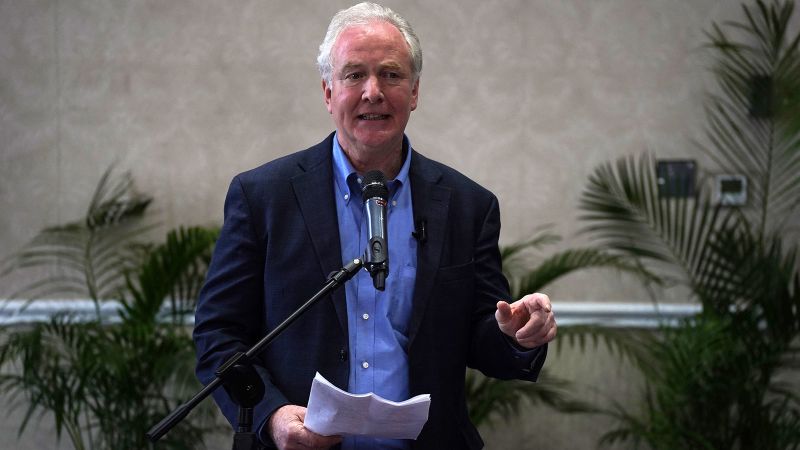On a recent trip to El Salvador, Senator Chris Van Hollen of Maryland recounted a poignant meeting with Kilmar Abrego Garcia. Abrego Garcia, a Salvadoran national residing in Maryland, has found himself embroiled in a distressing circumstance due to his wrongful deportation to El Salvador. Van Hollen described Abrego Garcia’s experiences at the notorious CECOT prison, noting that he feels “traumatized” by his experience there. He conveyed to Van Hollen that while he was not fearful of the inmates in his immediate cell, he was nonetheless traumatized and intimidated by other prisoners in different blocks, who called out and taunted him.
The senator revealed that Abrego Garcia was recently transferred from the maximum-security CECOT prison to another detention facility just nine days prior to their meeting. Van Hollen had previously traveled to El Salvador with the intent of advocating for the man’s release. His initial attempts to meet Abrego Garcia were thwarted when access to the maximum-security prison was denied. This case has gained notoriety, being linked to the Trump administration’s stringent deportation policies. Abrego Garcia was deported mistakenly in March, a situation that has highlighted broader concerns about civil rights and due process within the immigration system.
Van Hollen emphasized that the implications of this case extend beyond Abrego Garcia; it is a matter of protecting the constitutional rights of all individuals living in the United States. He articulated this sentiment by asserting that denying the rights of one individual could set a precedent threatening the constitutional rights and due process for everyone. Indeed, although Abrego Garcia had not been legally present in the U.S. before his deportation, a previous court order from 2019 specifically prohibited his return to El Salvador. The Trump administration itself conceded that the deportation occurred due to a clerical error.
A federal judge issued a ruling asserting that the Trump administration had to facilitate Abrego Garcia’s return home, and the Supreme Court largely endorsed this directive. However, top officials in the Trump administration have denied any notion of a wrongful deportation, arguing that because Abrego Garcia is Salvadoran, he belongs in El Salvador. Compounding this situation, U.S. officials have alleged that Abrego Garcia has ties to the MS-13 gang, a designation the administration ranks as a foreign terrorist organization. This claim, however, is disputed by Abrego Garcia’s legal team, which maintains that he has no association with gang activities.
Critics in the political arena have seized upon Van Hollen’s advocacy as a point of contention, with supporters of Trump using it to take jabs at Democrats. Trump himself took to his social media platform to mock Van Hollen’s recent visit, dismissively calling him a “GRANDSTANDER.” The White House followed suit by contrasting an image of Van Hollen meeting Abrego Garcia with a photograph of Trump meeting with a grieving mother whose daughter was murdered by an undocumented immigrant, framing the visuals as illustrative of contrasting moral standings.
Additionally, the White House has stated emphatically that Abrego Garcia would not be allowed to return to the United States. This sentiment was echoed by Salvadoran President Nayib Bukele, who stated on social media that now that Abrego Garcia has been confirmed healthy, he would remain under the custody of El Salvador’s government. The statements and positions taken by government authorities from both the U.S. and El Salvador have added layers of complexity and conflict to an already deeply challenging and emotionally charged situation for those involved.
The involvement of various legal and governmental frameworks indicates that the consequences of this particular case extend beyond mere deportation; they reflect the ongoing tensions regarding immigration policy, national security, and human rights. The case of Kilmar Abrego Garcia serves as a critical reminder of the precarious balance between upholding national interests and protecting individual rights, underscoring the relentless challenges faced by individuals caught in the crosshairs of immigration enforcement.



